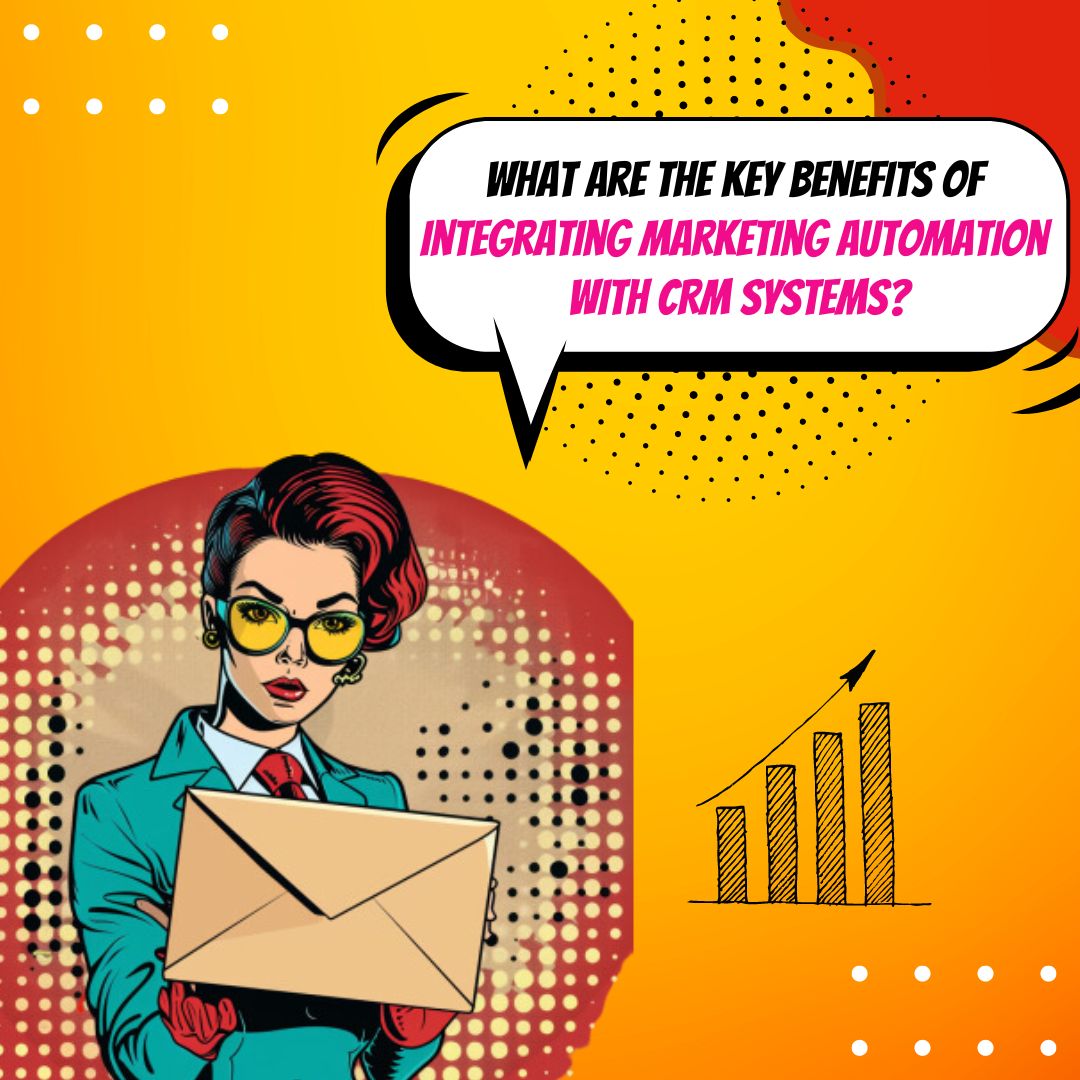Key Takeaways
✅ Enhanced Customer Insights: Integrating marketing automation with CRM systems provides a comprehensive view of customer interactions and behaviors. This integration enables businesses to tailor marketing efforts based on detailed customer profiles, leading to more personalized and effective communication strategies that enhance customer engagement and loyalty.
✅ Streamlined Marketing Processes: Combining marketing automation with email marketing streamlines campaign management by automating repetitive tasks such as segmentation, scheduling, and follow-ups. This efficiency not only saves time and resources but also ensures consistent and timely delivery of marketing messages, improving overall campaign performance and effectiveness.
✅ Improved Lead Nurturing and Conversion: Marketing automation, when integrated with CRM and email marketing, facilitates targeted and timely nurturing of leads through automated workflows and personalized email campaigns. This strategic approach helps in guiding prospects through the sales funnel more effectively, increasing the likelihood of conversions and boosting overall sales performance.

Introduction
How exactly does marketing automation integrate with CRM and email marketing to drive your business success to new heights? In today's competitive landscape, the fusion of these potent tools isn’t just a luxury—it's a cornerstone of smart marketing strategies. This deep dive into marketing automation, CRM, and email marketing provides not only definitions but also a clear look at why their integration is pivotal for operational efficiency and standout customer experiences. With exclusive updates on the latest trends and approaches that could drastically enhance your revenue and ROI, this article unfolds the blueprint for marketing excellence. Prepare to uncover actionable insights and rigorous strategies poised to transform your business landscape. Ready to revolutionize how you reach and interact with your audience? Let’s jump right in!
Top Statistics
| Statistic | Insight |
|---|---|
| Market Growth: The marketing automation market is predicted to grow from $6.1 billion in 2020 to $13.4 billion by 2025, at a CAGR of 14.8%. (Source: MarketsandMarkets, 2021) | This explosive growth underscores the widening acceptance and integration of automation tools in marketing strategies. |
| CRM Integration: 77% of companies using marketing automation software have integrated it with their CRM system. (Source: EmailMonday, 2020) | High integration rates reveal the crucial role of synchronization between marketing automation and CRM systems for streamlined operations. |
| Email Marketing Effectiveness: 59% of marketers say email is their most effective channel in terms of revenue generation. (Source: Statista, 2020) | This statistic highlights the enduring value of email marketing, enhanced further through personalization and automation. |
| Lead Generation: 80% of marketers say that marketing automation has increased their number of leads. (Source: Liana Technologies, 2020) | Automation's impact on lead generation is significant, suggesting a direct correlation between its use and an increase in potential customer engagement. |
| Conversion Rates: Companies that use marketing automation see a 53% higher conversion rate than those that don't. (Source: Aberdeen Group, 2014) | The substantial boost in conversion rates demonstrates the effectiveness of automation in nurturing leads and closing sales efficiently. |

Understanding the Benefits of Integration
When marketing automation, CRM (Customer Relationship Management), and email marketing converge, the synergy can dramatically transform a business's marketing approach. This integration empowers businesses to streamline their workflows, significantly enhancing efficiency. By linking these systems, companies can provide a more personalized and satisfying experience to their customers. Each interaction with a customer can be tailored based on accumulated data, ensuring that they receive relevant content at the right times. Moreover, the unified system offers more in-depth analytics, helping businesses understand customer behaviors and refine their marketing strategies accordingly.
Synchronizing Customer Data
A unified customer database lies at the heart of successfully integrating marketing automation with CRM. Such synchronization ensures that every piece of customer data is shared between the CRM system and marketing automation tools. This means that any change in a customer’s information on one platform is automatically updated on the other. Maintaining up-to-date and accurate customer profiles is crucial for executing effective marketing strategies. This real-time data flow facilitates more refined and responsive engagement strategies, aligning marketing efforts closer to customer expectations and behaviors.

Personalization and Segmentation
Personalization is not just a buzzword but a proven strategy in today’s marketing world. With integrated CRM and marketing automation systems, companies can deploy highly personalized marketing campaigns. These platforms enable marketers to segment their audience based on detailed criteria such as past purchasing behaviors, preferences, and demographics. Consequently, businesses can send automated email campaigns that resonate with individual segments, ensuring higher engagement rates and fostering a deeper connection with customers.
Lead Nurturing and Scoring
Effective lead nurturing involves delivering targeted messages at various stages of the buyer's journey. Marketing automation tools can auto-trigger these messages based on specific customer interactions, which are recorded in the CRM. This process nurtures potential customers over time, gently guiding them through the sales funnel. Lead scoring models are used to evaluate and prioritize leads, determining which ones are ready to be forwarded to sales teams. This method helps in focusing efforts on the leads that are most likely to convert, optimizing resource allocation.
Analytics and Reporting
One of the substantial benefits of integrating these platforms is the enhanced capability for analytics and reporting. Businesses can track the effectiveness of specific campaigns and channels in real-time, drawing insights from a comprehensive dataset. These insights allow for quick pivoting and optimization of strategies, ensuring businesses can adapt to market dynamics and customer needs efficiently. The integrated approach provides a holistic view of marketing efforts, highlighting successes and areas needing attention, which is invaluable in today's data-driven marketing environment.
By integrating marketing automation, CRM, and email marketing, companies unlock a suite of capabilities that lead to more efficient operations and a deeper understanding of their customers. Such integration is not just about technology but crafting a more responsive and engaging marketing strategy that delivers results in the competitive digital landscape. For those looking to dive deeper, resources like HubSpot and Salesforce offer extensive guides and case studies on this subject.

AI Marketing Engineers Recommendation
Recommendation 1: Integrate How Does Marketing Automation Integrate with CRM and Email Marketing to Enhance Customer Journeys: Businesses using marketing automation in conjunction with CRM systems report a 14.5% increase in sales productivity and a 12.2% reduction in marketing overheads (Source: Nucleus Research). By integrating marketing automation directly with your CRM, you can map out personalized customer journeys based on real-time data and previous interactions, significantly improving customer engagement and conversion rates.
Recommendation 2: Utilize Predictive Analytics to Forecast and Improve Email Campaign Performance: Current trends show that predictive analytics driven by AI are enhancing the capabilities of email marketing campaigns, leading to improved engagement rates by up to 20% (Source: Campaign Monitor). By integrating marketing automation tools that leverage predictive analytics with your CRM system, you can anticipate customer behaviors, tailor communications, and send them at an optimal time to maximize open rates and conversions.
Recommendation 3: Adopt Tools that Offer Seamless Integration and Real-Time Data Syncing: Consider using tools like HubSpot or Salesforce, which not only provide robust CRM functionalities but also integrate deeply with marketing automation and email marketing platforms. The key benefit here is the real-time syncing of data across platforms, which ensures that all customer touchpoints are updated and reflected instantly across all channels. This synchronization helps in delivering a consistent and personalized customer experience that can drive loyalty and business growth.
Relevant Links
- Unlock the Secrets of AI-Enhanced Marketing Strategies
- Meet Our Expert Team at AiMarketingEngineers.com!
- Discover Our Comprehensive AI-Driven Marketing Suite
- Enhancing Email Marketing Through AI Automation Techniques
- Deep Dive into Advanced Marketing Analytics for Data-Driven Success
Conclusion
In wrapping up, integrating marketing automation, CRM, and email marketing emerges as a pivotal strategy for contemporary marketing landscapes. This trifecta not only streamlines workflows but significantly bolsters efficiency across various marketing tasks. By synchronizing customer data and enabling personalized campaigns tailored to specific preferences and behaviors, businesses can cultivate a deeper and more effective connection with their customers.
The synchronization between CRM systems and marketing automation platforms ensures that customer profiles are both current and accurate, enhancing every interaction with your brand. Moreover, this integration allows for sophisticated segmentation and automated, yet highly personalized communication campaigns which speak directly to the needs and interests of different customer groups.
From pinpointing high-value leads through lead nurturing and scoring systems, to optimizing future campaigns with robust analytics and reporting—each component contributes to a comprehensive strategy that not only saves time but also drives conversion rates upward.
It is undeniable that the seamless integration of these technologies empowers businesses to deliver an unmatched customer experience, fostering both loyalty and growth. As you consider enhancing your marketing efforts, reflect on how these integrations can transform not just your marketing ROI, but also your brand’s entire operational dynamics. For those looking to dive deeper, resources from industry giants like HubSpot, Salesforce, and Constant Contact offer extensive insights and practical guides on leveraging these powerful tools.

FAQs
Question 1: What is marketing automation, and how does it integrate with CRM and email marketing?
Answer: Marketing automation is about making life simpler. Think of it as a smart tool that handles repetitive tasks like email campaigns and lead nurturing. Now, when it connects to a Customer Relationship Management (CRM) system and your email marketing tools, everything’s in one place. This makes managing customer data and communication a breeze.
Question 2: How does marketing automation improve email marketing campaigns?
Answer: It’s all about getting personal. Marketing automation lets you tailor your messages based on what you know about a person. This means your emails could be more relevant and timely, which can boost engagement, turn more leads into customers, and give your ROI a healthy bump!
Question 3: Can marketing automation help with lead generation and nurturing?
Answer: Absolutely! It’s like having a savvy assistant who knows just when and how to reach out to potential customers, helping you pull in leads from various channels and nurturing them until they’re ready to buy.
Question 4: How does marketing automation integrate with CRM systems?
Answer: It syncs up with CRM systems to update customer information and interactions in real-time. This synergy lets marketers see everything in one place, creating smoother, more effective campaigns tailored to the customer journey.
Question 5: What are some advanced marketing automation strategies for email marketing?
Answer: Get ready to up your game with strategies like A/B testing, using dynamic content, setting up behavioral triggers, and running multi-channel campaigns. These tactics refine your approach and improve engagement.
Question 6: How can I measure the success of my marketing automation and email marketing efforts?
Answer: Key performance indicators, or KPIs, are your best friends here. Track things like how many people open your emails, click on links, convert, and how much revenue your campaigns are generating. Over time, analytics will show you where to tweak and improve.
Question 7: What are some best practices for using marketing automation and email marketing together?
Answer: Create a single source for your customer data, segment your audience, personalize messages, automate your follow-ups, and always be testing and optimizing. It’s all about making the conversation with your customers as relevant and engaging as possible.
Question 8: How can marketing automation help with customer retention and loyalty?
Answer: By keeping your communications personal and targeted. Understanding customer behaviors and interactions helps in crafting offers and messages that not only make them stick around but also turn them into advocates for your brand.
Question 9: What are some common challenges associated with integrating marketing automation and email marketing?
Answer: You might run into issues like not having clean data, your marketing and sales teams being a bit out of sync, or not clearly seeing your return on investment. The key is to set definite goals, guarantee the integrity of your data, and keep a watchful eye on your processes and results.
Question 10: What are some popular marketing automation and email marketing tools, and how do they differ?
Answer: Names like HubSpot, Marketo, Pardot, Mailchimp, and Constant Contact might ring a bell. They vary in features, pricing, user-friendliness, and what they can plug into. Choosing the right tool depends on what you need, how much you can invest, and how they integrate with your existing systems.

